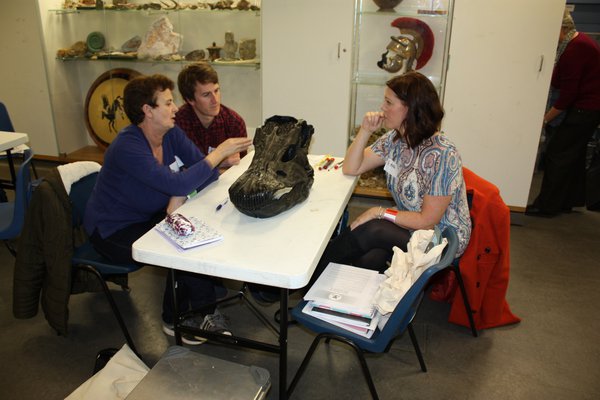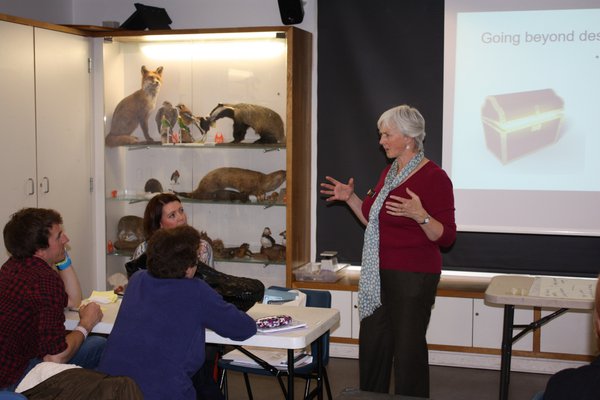Real World Science Leadership Initiative
Transforming Learning in Science through Collaboration with Museums
Transforming Learning in Science
We are currently working with 18 teachers who are participating in the Transforming Learning in Science Through Collaboration with Museums CPD programme. This is the third year of a project run by the Great North Museum: Hancock in collaboration with the Natural History Museum as part of the Real World Science programme. We are also working in collaboration with STEM learning and the North Tyneside Learning Trust. Recruitment for the 2020/21 cohort of teachers will begin around May 2020; if you are interested, please contact kate.holden@twmuseums.org.uk.
The programme runs throughout the academic year 2019/20 and aims to support primary school science subject leaders to transform practice in their school through sustained and quality engagement with local museums. This year we are working with:
- Amberley Primary School
- Belsay Primary School
- Bridgewater Primary School
- Brighton Avenue Primary School
- Denbigh Community Primary School
- Dr Thomlinson CE Middle School
- Kingston Park Primary School
- Knoplaw Primary School
- Moorside Primary School
- Our Lady and St Anne's RC Primary School
- Ridgeway Primary Academy
- Rowlands Gill Primary School
- Sacred Heart RC Primary School
- Simonside Primary School
- St John's Primary School
- West Jesmond Primary School
This CPD programme is free to participating schools; museum staff and local experts will work with primary science leaders to:
- increase the teachers’ knowledge of the human and physical resources of museums which can be used to support science learning, using the Great North Museum: Hancock as an example;
- give subject leaders access to areas of the museum and to experts in order to develop their own knowledge and skills for dissemination among their colleagues;
- support science leaders in developing a programme of museum visits to explore enquiry and object based learning, teaching at greater depth and mastery learning in the science curriculum; bring enhanced excitement and confidence about science to your school’s staff and pupils.

This programme of training aims to:
- empower science subject leaders with new skills and confidence so that they can transform science learning in their schools, creating a sustainable change
- develop enquiry-led thinking and object-based learning approaches
- encourage mastery approaches to teaching the science curriculum
- change how participating teachers identify as education professionals
- create schools in which teachers and pupils are enthused with science, inside and outside of the classroom
- develop partnership and collaboration between schools and museums in order to extend and deepen the impact of museum visits
We will do this by:
- encouraging participating teachers to reflect (along with their colleagues) on the current state of science learning and teaching in their schools, what they would like to change and how that can be achieved in a resilient way
- supporting participants in developing and refining a GROW model to audit and plan for change in their school throughout the course of the project
- raising confidence in subject leaders both about their own professional practice and how they can support the professional practice of their colleagues
- introducing a variety of methodologies around enquiry-based and object-based learning which can be used in museum, classroom or other contexts to increase the excitement of science learning
- working to help develop new ways of thinking and to support not just subject knowledge but the working scientifically curriculum
- changing and extending the way in which participants and their schools use museums and museum-style activities as part of their science programme
- bringing together teachers, museum professionals and scientists
- introducing ways of making science feel more ‘real’ to children in primary schools
- encouraging the development of a support network among participants from both the museum and the schools
- giving participants the opportunity to try out new techniques with their class and other classes in the school, discuss how well this has worked and refine their techniques
- supporting participants in producing a portfolio and case study to further their professional development

At the end of the programme we intend that participants will:
- have a personal and school-wide sustainable plan to transform science learning and teaching in their school
- have produced a portfolio of work and a case study to further their professional development
- feel more confident and excited about science in the context of primary school learning
- feel more confident about supporting their colleagues in their role as science subject leader
- want to work further with museums and other organisations
- have enthusiastic, engaged pupils who are interested in doing science as well as learning about it
Feedback from Session 1:
"Great approaches to enquiry based learning. Reflection time allowed me to generate ideas for case study. Questioning strategies were excellent and can be applied across the curriculum."
"As a relatively new lead I have begun to formulate a plan to guide staff and school in raising profile of science."
"Thank you to Kate and Tom for some fantastic ideas and paths to follow in the aim of improving science."
The Real World Science Leadership Initiative will develop a new innovative model of teacher training. Students learn best when they are able to ask and answer their own questions about the natural world. This is common practice amongst museum educators, but rare in schools. This initiative will train and empower teachers to shape lessons around students’ own questions, in close partnership with their local natural history museums.

This two year pilot has been generously supported by the Foyle Foundation.



